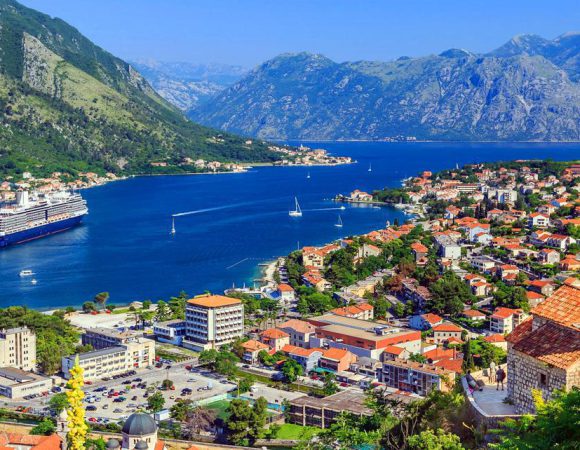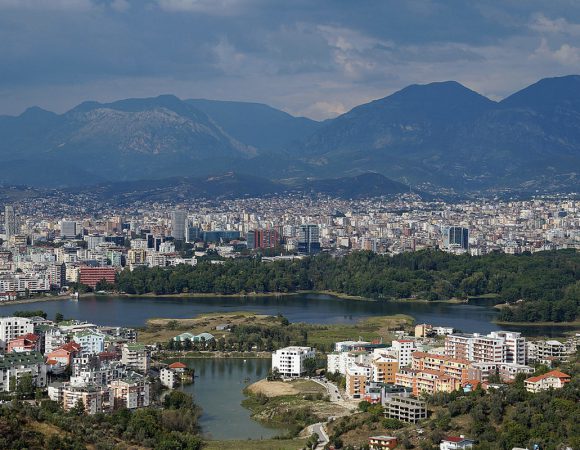
Albania
Located in Southern Europe, Albania ‘s borders are drawn with Montenegro in the north, Serbia in the northeast, Macedonia in the east and Greece in the south. The country also has coastlines on the Adriatic Sea to the west and the Ionian Sea to the southwest.
Although the majority of Albanians are of Muslim origin, they consist of large minorities belonging to the Christian ( Orthodox or Catholic ) religion. Marriage between people of different religious backgrounds is very common, and in some places it is even the norm.
Infrastructure weakness, which is one of the most important problems of the country, is in a very bad condition despite the improvement works. Most of the people in Albania prefer to travel by private minibus called furgons or by public bus. The scenery, the people watching in the fields, and the atmosphere on the long journeys by train, where tickets are so cheap, are priceless. Hitchhiking is not common in the country. Cyclists are highly respected on the roads.
There are no vaccination requirements to enter or leave the country. In the summer, it will be useful to use an insect repellent spray. Mosquito season is very active especially in the lowland areas in the west, which is the former swamp area. It is necessary to be very careful, as broken glass and sea urchins are frequently encountered on the beaches and in the sea.
Although the country, which is not at the forefront in the tourism sector, has not been very popular until now, it has many advantages as it is a Mediterranean country. Much cheaper and less crowded than the more popular holiday destinations , Albania is a must -go with a cake if you like wilderness, scenery and Mediterranean weather.
A castle was built in the past in Berat, which is located in the middle of the city of Osum , and it is erected on a hill. On this hill, the original Kalaja Fortress can be seen and there are many churches and mosques. Berat is also called the ” city of a thousand windows ” because of the large windows in front of the houses . These windows, which the typical houses of the country have, are almost the silhouette of the city.
Compared to the Italian Riviera in the southwest of the country , the Albanian Rivera is a much quieter and less crowded coastline.
For history lovers, you can find the ancient city ruins of God Apollo , located next to the city of Fier . Apollonia was the largest and most important city of the ancient world. Libraries, temples, theatres, triumphal arch and decayed buildings can be visited.
Located in the south of Albania, Gjirokastra is on the UNESCO World Cultural Heritage list with its unique architectural style buildings . These unique buildings are among the most beautiful examples reflecting the Balkan architecture, and the houses made of stone are like small castles. Stones, which were used as degrees in ancient times, are the symbol of the city today. That’s why the city is called ” the city of stones “.
Those who want to learn about the culture of the country should definitely visit the capital Tirana for museums and cultural activities.
Capital, Cities and Regions of Albania
Albania, governed by a unitary parliamentary republic, is divided into 12 administrative regions, 36 provinces and 61 municipalities. Its capital is Tirana. Its major cities are Berat, Durres, Elbasan, Fier, Ergiri, Görice, Lech, Debre, Shkodër, Vlonya and Kukes.
Located in Southern Europe, Albania is bordered by Montenegro to the north, Serbia to the northeast, Macedonia to the east and Greece to the south. The country also has coastlines on the Adriatic Sea to the west and the Ionian Sea to the southwest.
When to go to Albania
The coastal areas of the country, where the Mediterranean climate prevails, are quite hot due to heat waves. The winter season passes with light rain and moderate temperatures.
The best time to visit Albania would be May, June and September.
Albanian Culture
Along with what Albanian culture brings, the people of the country are very hospitable and proud of it . Albanians, who are a very affectionate people, love to take long walks in the streets of the city, not to drink coffee, especially the younger generation nightlife activities and dancing.
Albanian Cuisine
Like most Mediterranean and Balkan countries, Albanian cuisine was formed under the influence of a strong and long history. At different times, the region was dominated by Greece, Serbia, Italy and the Ottoman Empire, and each empire left deep traces on Albanian cuisine.
Souvenirs to Buy from Albania
Souvenirs and handicraft items can be bought from almost all of Albania, especially Tirana and the traditional Kruja Bazaar .
Albania’s Festivals
Due to Albanian history, ethnic and religious backgrounds, many different cultural and art festivals are celebrated throughout the country every year.
The largest is the pagan Summer Festival, celebrated on 14 March each year . The festival is designed to celebrate the end of winter and the rebirth of nature, a renewal among Albanians.
The “ Gjirokaster National Folklore Festival ” is an artistic music festival held every 5 years and is considered one of the most important events in Albanian culture. All Albanian people living in Albania , the Albanian Diaspora and the Balkans come to the festival . It is celebrated with traditional music, clothes and dances.
Another major music festival in Albanian lands is “ Kenga Magjike ( Enchanting Song )”. It is performed with a large large ensemble of many singers and bands from Albania and neighboring countries.
The most important Albanian holiday is Independence Day . Celebrated on November 28, the feast marks the end of Ottoman rule in 1912, at the end of five centuries.
Holidays / Holidays / Important Days in Albania
Summer Day Holiday (14 March)
Nowruz (22 March)
Easter (March 25-28)
Labor Day (May 01-02)
Feast of Ramadan
Eid al-Adha (September 13)
Mother Tereza’s Blessing Day (October 19)
Albanian National Day (28 November)
29 November Liberation Day (29 November)
National Youth Day (08 December)
Christmas (December 24-26)
Climate and Weather in Albania
The Mediterranean climate prevails in Albania, which is located in Southern Europe. While the winter months are warm and rainy, the summer season is hot and dry.
A Brief History of Albania
It was occupied by Italy in 1939 before coming under the protection of Nazi Germany in 1943, where Greater Albania was established. Albania has undergone widespread social and political transformations under the influence of the communist era and has been quite isolated from international societies. In 1991, the Socialist Republic was dissolved and the Republic of Albania was established.
Albania’s Economy
Albania’s transition from a socialist planned economy to free market capitalism has been largely successful. Agriculture is one of the most important economic incomes in Albania, which is a traditional agricultural country . However, the poverty rate is quite high in the country that has been heavily affected by the crisis. Agriculture is still done with traditional methods in the country, which is one of the most important factors of inefficiency.
Religion and Belief in Albania
The country is a secular state. 56 percent of the Albanian population defines itself as adherent to Islam , 14 percent non- believer , 10 percent Catholic Christian , 7 percent Orthodox , 2.5 percent Atheist , and the remaining percent adhere to other religions.
Languages Spoken in Albania
The official language of Albania is Albanian. Albanians generally speak more than two languages. While English , Italian and Greek are the most widely spoken languages, French is also known, although not very common. Other spoken languages are Serbian , Romanian , German and Turkish .
It is better not to speak Serbian unless you have to because of political problems with Serbia .






